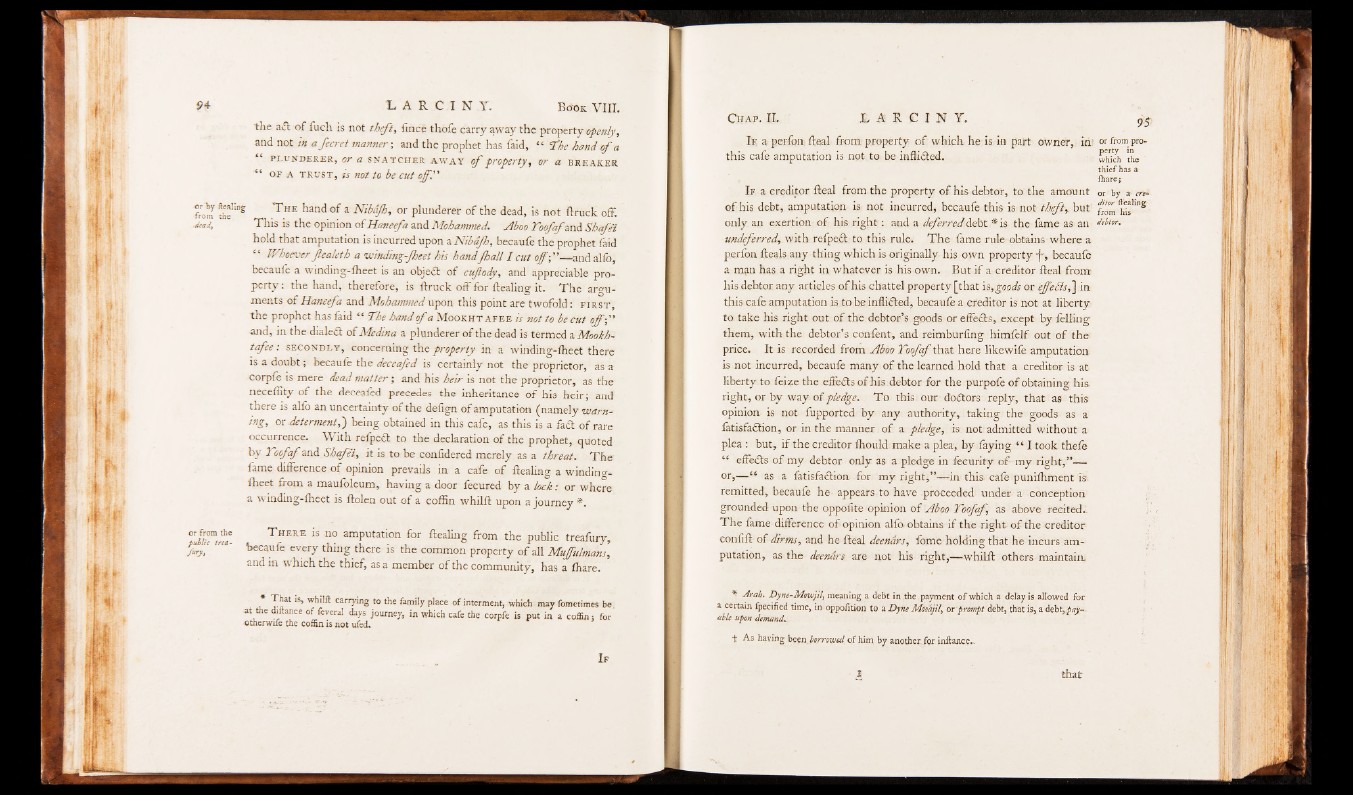
the adt of fuch is not theft, fince thofe carry away the property
and not in afecret manner; and the prophet has faid, “ The hand < f a
plun derer, or a sn a t ch e r a w a y ©ƒ property ^ or a BREAKER
“ OF a TRUST, is not to be cut off.”
fronf aJ1'"8 hand a Nibafh, or plunderer of the dead, is not ftruck off.
.«W, This is the opinion of Haneefa and Mohammed. Aboo ToofafmA Shafei
hold that amputation is incurred upon a Nibdfh, becaufe the prophet faid
*‘ Whoever ftealeth a winding-Jheet his handJhall I cut off-,’ ’— and alfo,
becaufe a winding-fheet is an obje& of cujlody, and appreciable property
: the hand, therefore, is ftruck off for Healing it. The arguments
of Haneefa and Mohammed upon this point are twofold: f ir s t ,
the prophet has faid “ The hand o f a M ookht a f e e is not to be cut off-,"
and, in the dialed! of Medina a plunderer of the dead is termed a Mookh-
tafee: se con d l y, concerning the property in a winding-fheet there
is a doubt; becaufe the deceafed is certainly not the proprietor, as a
corpfe is mere dead matter; and his heir is not the proprietor, as the
neceffity of the deceafed precedes the inheritance of his heir; and
there is alfo an uncertainty of the defign of amputation (namely warning,
os determent,') being obtained in this cafe, as this is a fad of rare
occurrence. With refpedt to the declaration of the prophet, quoted
by TofcfzaA. Shafei, it is to be confidered merely as a threat. The
fame difference of opinion prevails in a cafe of ftealing a windino--
fheet from a maufoleum, having a door fecured by a lock: or where
a winding-fheet is ftolen out of a coffin whilft upon a journey *.
^/iTtna T here is no amputation for ftealing from the public treafury,
%y',C ,r'a~ becaufe every thing there is the common property of all Muffulmans,
and in which the thief, as a member of the community, has a fhare.
carrying to the family place o f interment, which may fometimes be
at the dntance o f feveral days journey, in which cafe the corpfe is put in a coffin; for
otherwife the coffin is not ufed.
If
I f a perfon fteal from property o f which he is in part owner, in! or fi™». Pr°-
this cafe amputation is not to be inflidted. : the
thief has a
fhare ;
I f a creditor fteal from the property o f his debtor, to the amount or by a ere*
of his debt, amputation is not incurred, becaufe this is not theft, but:
only an exertion o f his right: and a deferreddebt *is the fame as an «^far.
undeferred, with refpedt to this rule. The fame rule obtains where a
perfon fteals any thing which is originally his own property -j-, becaufe
a m^n has a right in whatever is his own. But if a creditor fteal front
his debtor any articles of his chattel property [that is,goods or effeBs,~\ in
this cafe amputation is to be inflidted, becaufe a creditor is not at liberty
to take his right out of the debtor’s goods or effedts, except by felling
them, with the debtor’s confent, and reimburfing himfelf out of the
price. It is recorded from Aboo Toofaf that here like wife amputation
is not incurred, becaufe many of the learned hold that a creditor is at
liberty to feize the effedls of his debtor for the purpofe of obtaining his.
right, or by way of pledge. T o this our dodtors reply, that as this
opinion is not fupported by any authority, taking the goods as a
fatisfadtion, or in the manner of a pledge, is not admitted without a
plea : but, if the creditor fhould make a plea, by faying “ I took thefe
“ effedts of my debtor only as a pledge in feeurity of- my right,”—
or,— “ as a fatisfadtion for my right,”— in this cafe punifhment isi
remitted, becaufe he appears to have proceeded under a conception
grounded upon the oppofite opinion of Aboo Toofaf, as above recited..
The fame difference o f opinion alfo obtains if the right o f the creditor
confift of dirms, and he fteal deendrs, feme holding that he incurs amputation,
as the deendrs are not his right,— whilft others maintain
* Arab. Dyne-Mawjil, meaning a debt in the payment o f which a delay is allowed for
a certain fpecified time, in oppoiition to a Dyne Mtohjil, o r prompt debt, that is, a debt,r>uy~
able upon demand..
t A s having been borrowed o f him by another, for inftance..
that